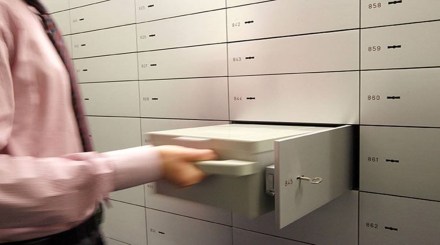A bank locker is a secure storage facility provided by banks for customers to safeguard valuable items such as jewelry, documents, and other important possessions. It typically involves renting a safe deposit box within the bank’s vault. Keeping valuables safe is a top priority for everyone. While home safes offer convenience, bank lockers provide an extra layer of security against theft, fire and other issues of storage.
Often Indian households keep their jewellery at home, but it becomes quite inconvenient to ensure safety as you will always be afraid of leaving your house unattended with precious metals lying unsafe in your cupboards. Choosing whether to keep jewellery at home or in a bank locker in India involves considering various factors related to safety, security, convenience, and personal preferences. Let’s explore these aspects in detail:
Selecting a Bank
While opting for a bank locker we typically get confused as to which bank we must choose. It is advisable to choose a reputable bank with a strong security system and a history of reliability. Consider factors such as the bank’s location, operating hours, and fees associated with locker rentals.
Also Read: How to earn higher cashbacks with credit card payments
Rental Process
Before you choose a bank locker, you must know how much charges you will have to pay. That is why you should contact the bank to inquire about locker availability, sizes, and rental fees. Complete the necessary paperwork, provide identification documents, and pay the required rental charges.
Accessing the Locker
Upon renting a locker, the bank provides two keys – one for you and one for the bank. Both keys are required to access the locker, ensuring an additional layer of security.
Privacy and Confidentiality
Bank lockers provide a level of privacy, as the contents are known only to the locker holder. Banks are legally bound to maintain the confidentiality of the locker’s contents. You should go through the terms and conditions and in case of any query get in touch with the bank officials to make sure your belongings are safe and confidential as per the RBI rules and regulations.
What to Keep in a Bank Locker?
1. Jewelry:
Precious jewelry, especially items with sentimental value or significant monetary worth should be kept in a bank locker to minimize the risk of theft or loss.
2. Important Documents:
Store critical documents like property papers, insurance policies, wills, and legal agreements in the bank locker for protection against theft, fire, or other unforeseen events.
Adhil Shetty, CEO, Bankbazaar.com, says, “As per the directives of the RBI, banks bear the responsibility for ensuring the safety and security of premises housing safe deposit vaults. It is incumbent upon banks to undertake all necessary measures to prevent incidents such as fire, theft, burglary, robbery, dacoity, and building collapse resulting from their own shortcomings, negligence, or any act of omission/commission.”
Keeping Jewelry at Home
1. Convenience
Some individuals prefer keeping jewelry at home for the sake of convenience. This allows for easy access and wearing of jewelry on a daily basis without the need to visit the bank. However, it is not safe to keep your expensive jewellery at home.
2. Insurance
If you choose to keep jewelry at home, consider getting insurance coverage to protect against risks like theft, fire, or natural disasters.
Shetty says, “While banks are not held liable for damages or losses of contents within a locker due to natural calamities or acts of God, such as floods, thunderstorms, earthquakes, and lightning, they are expected to exercise due diligence in safeguarding their locker systems from such catastrophic events.”
The decision to keep jewellery at home or in a bank locker depends on your preference and the perceived level of risk. While a bank locker provides a higher level of security, some may prioritise the convenience of having their possessions readily accessible at home. Whether you opt for a bank locker or choose to keep jewellery at home, your decision should be based on your circumstances and priorities.
